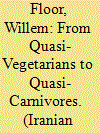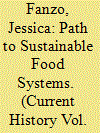|
|
|
Sort Order |
|
|
|
Items / Page
|
|
|
|
|
|
|
| Srl | Item |
| 1 |
ID:
180032


|
|
|
|
|
| Summary/Abstract |
Until the twentieth century there was little change in the diet of Iranians. Bread was the major staple, accompanied by vegetables, fruits, yoghurt, and nuts. Meat and rice were a luxury food for most consumers. In the nineteenth and twentieth centuries new food items were adopted by Persian consumers. After 1970, the modern Iranian diet—large amounts of white rice, meats, sugar-sweetened beverages and sweet/deserts, with few vegetables, herbs, nuts or fruits—has grown increasingly similar to the US diet, with the same health problems.
|
|
|
|
|
|
|
|
|
|
|
|
|
|
|
|
| 2 |
ID:
181528


|
|
|
|
|
| Summary/Abstract |
Agriculture systems, which account for a sizable share of global greenhouse gas emissions, are placing a growing burden on the environment while also contributing to increasingly common health problems. Climate change is making the situation worse by reducing agricultural productivity as well as the nutritional content of certain crops, which in turn is driving intensified production to meet global food demand. To break out of this potentially catastrophic feedback loop, societies must realign agricultural policies, financial incentives, and diets to promote health and environmental sustainability.
|
|
|
|
|
|
|
|
|
|
|
|
|
|
|
|
| 3 |
ID:
112246


|
|
|
|
|
| Publication |
2012.
|
| Summary/Abstract |
The greenhouse gas (GHG) emissions embodied in 61 different categories of food are used, with information on the diet of different groups of the population (omnivorous, vegetarian and vegan), to calculate the embodied GHG emissions in different dietary scenarios. We calculate that the embodied GHG content of the current UK food supply is 7.4 kg CO2e person-1 day-1, or 2.7 t CO2e person-1 y-1. This gives total food-related GHG emissions of 167 Mt CO2e (1 Mt=106 metric tonnes; CO2e being the mass of CO2 that would have the same global warming potential, when measured over 100 years, as a given mixture of greenhouse gases) for the entire UK population in 2009. This is 27% of total direct GHG emissions in the UK, or 19% of total GHG emissions from the UK, including those embodied in goods produced abroad. We calculate that potential GHG savings of 22% and 26% can be made by changing from the current UK-average diet to a vegetarian or vegan diet, respectively. Taking the average GHG saving from six vegetarian or vegan dietary scenarios compared with the current UK-average diet gives a potential national GHG saving of 40 Mt CO2e y-1. This is equivalent to a 50% reduction in current exhaust pipe emissions from the entire UK passenger car fleet. Hence realistic choices about diet can make substantial differences to embodied GHG emissions.
|
|
|
|
|
|
|
|
|
|
|
|
|
|
|
|
|
|
|
|
|